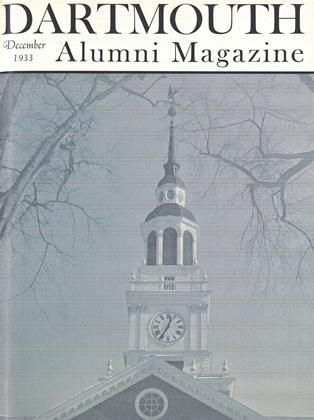The first steps toward more rigid supervision of off-campus rooming were taken by the Administration when President Hopkins, in accordance with a vote of the Board of Trustees, appointed a standing committee on student residences. Dean Neidlinger will act as chairman of the committee, and its other members will include Dean Laycock; Dean Strong; Halsey C. Edgerton, treasurer; Francis J. A. Neef, Director of Personnel Research; Dr. Howard N. Kingsford, Medical Director; Max A. Norton, bursar; and Albert I. Dickerson, executive assistant to the President.
At its first meeting the Committee on Student Residence announced that it.would prepare a form of application for landlords who desire to have their properties approved as places of student residence. All landlords will be required to apply for approval, and no student will be permitted, after the close of the present college year, to room in any place not on the approved list.
Shortly after the opening of the present college year, President Hopkins appointed a special committee to study the rooming situation, and it was upon the recommendations of this committee that the Board of Trustees on October 26 voted:
1. That the President be empowered to appoint a Standing Committee on Student Residence, with a minimum membership of five, whose duty it shall be to supervise all places of student residence; to make regulations relating thereto; subject to the approval of the President; to provide for the enforcement of such regulations; and to make such studies and recommendations as the Committee may from time to time consider desirable for the proper housing of students.
2. That no student in Dartmouth College, including graduate students and students in the Associated Schools, shall be permitted in any College year to reside in any place which has not been listed as approved for that year by the Committee on Student Residence.
In explaining the conditions which led to the appointment of a special committee and to subsequent action by the Trustees, President Hopkins said, "Complaint had been made by parents to the Administration that the College did not exercise sufficient direction or even give sufficient advice so that it might be known what rooms outside the College plant conformed to the College requirements in regard to cubic feet of air, amount of light, and sanitary provisions. Moreover, through the period of a decade the proportion of illness among students rooming outside the College plant had been in excess of the figures having to do with those rooming in College buildings."
 View Full Issue
View Full Issue
More From This Issue
-
 Article
ArticleHANOVER BROWSING
December 1933 By Rees H. Bowen -
 Class Notes
Class NotesClass of 1910
December 1933 By Harold P. Hinman -
 Class Notes
Class NotesClass of 1930
December 1933 By Albert I. Dickerson -
 Sports
SportsFOLLOWING THE BIG GREEN TEAMS
December 1933 By C. E. Widmayer '30 -
 Class Notes
Class NotesClass of 1929
December 1933 By F. William Andres, Gus Wiedenmayer -
 Article
ArticleENGINEERING, A WAY OF LIFE
December 1933 By Arthur G. Tozzer '02







